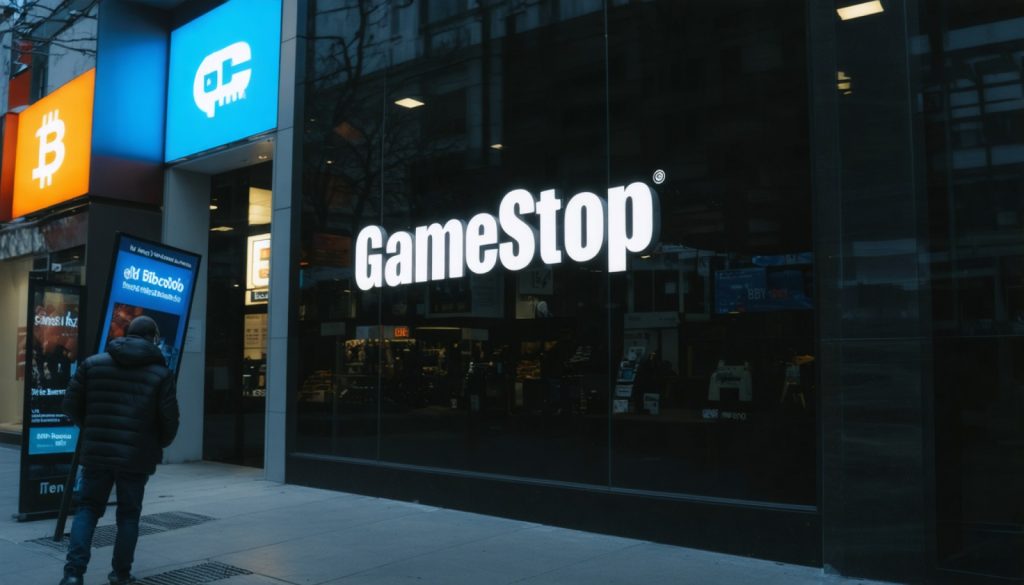
- GameStop embarks on a risky venture by issuing $1.3 billion in convertible bonds to buy Bitcoin, causing its stock to drop 22%.
- This strategy aims to emulate MicroStrategy’s Bitcoin success, raising skepticism about its sustainability and financial stability.
- An issuance of 46 million new shares seeks to bolster GameStop’s cash reserves but raises concerns over stock dilution.
- Short sellers increase activity, leading to a Short Sale Restriction by the New York Stock Exchange, reminiscent of the 2021 short squeeze.
- GameStop’s future is uncertain, balancing between ambitious crypto strategy and market volatility.
- Investors are closely monitoring potential gains and risks, hinging on Bitcoin’s performance and market reactions.
As GameStop storms into the volatile world of cryptocurrency, the financial markets find themselves on shaky ground. Unveiling a daring strategy to raise $1.3 billion via convertible bonds to purchase Bitcoin, GameStop witnessed its shares plummet by 22%, a stark reality check on its newfound ambitions.
Imagine the scene: a bustling stock market, tumultuous as a brewing storm, as GameStop reveals its bold intentions. Investors, caught off guard, react with a sell-off, reminiscent of past market upheavals triggered by the retailer’s roller-coaster valuation narrative. GameStop’s plan points to a desire to emulate the success of MicroStrategy’s Michael Saylor, a prominent figure whose Bitcoin-centric strategy became legendary in the corporate world. Yet, layers of skepticism cloak GameStop’s move, as analysts voice their doubts about the sustainability of such a crypto-driven course.
The issuance of 46 million new shares, part of GameStop’s grand scheme, aims to fatten its cash reserves to $6.1 billion. This strategic decision, however, raises concerns over dilution and financial stability, casting a shadow over investor confidence. Short sellers, ever-vigilant, leap at the opportunity, drawing comparisons to the infamous short squeeze saga of 2021, bringing back memories of a Reddit-fueled frenzy that shook Wall Street.
Short positions surged dramatically, prompting the New York Stock Exchange to enforce a Short Sale Restriction, ensuring a check on the rampant shorting of the stock. Meanwhile, the echoes of a never-ending battle between retail upstarts and seasoned institutional investors reverberate through the market corridors.
The heart of GameStop’s strategy mirrors that of MicroStrategy, a company that masterfully wielded convertible bonds to accrue a formidable Bitcoin cache. But unlike MicroStrategy, which saw its fortunes swell with the rising Bitcoin tide, GameStop’s venture comes with formidable uncertainties. Institutional bondholders, hedging against risk, send bearish signals, maintaining downward pressure on the already embattled stock.
For those adept at navigating the complex dynamics of convertible bonds, the potential for profit lies in shorting the stock before conversion, maximizing gains as they anticipate a lower conversion price. This strategy, inherently risky, offers investors a chance at redemption—should Bitcoin’s price ascend or if short sellers unwittingly trigger another epic squeeze.
Yet the reality remains: for GameStop, this gamble bears significant risk without a solid business transformation underpinning its stock price. The company stands at a crossroads, teetering between visionary ambition and speculative folly. In a world where Bitcoin can catapult a company’s fortunes into the stratosphere, GameStop’s bold play reflects a high-stakes chess game where stakes are nothing short of monumental.
Ultimately, GameStop’s future hinges on not just its audacity, but on the market’s verdict. Will the crypto world’s allure be enough to lift GameStop to new heights, or is this another chapter in the meme-stock saga destined for volatility? Investors around the world are watching nervously, eager to see if GameStop can tilt the scales in its favor—or if the market’s volatile currents will capsize its ambitious voyage.
GameStop’s Bold Bet on Bitcoin: Is It a Sound Investment Strategy or Speculative Folly?
The financial world is abuzz with GameStop’s audacious move to raise $1.3 billion through convertible bonds to buy Bitcoin, swiftly followed by a 22% drop in its share price. This article delves into the multifaceted aspects of GameStop’s gambit, offering insights, potential outcomes, and advice for investors navigating these turbulent waters.
Understanding GameStop’s Strategy
GameStop’s decision to invest heavily in Bitcoin seems to emulate MicroStrategy, a company that successfully leveraged Bitcoin investments to drive shareholder value. MicroStrategy’s CEO, Michael Saylor, became an icon in the corporate world by investing billions in Bitcoin, increasing the company’s value multifold as Bitcoin prices soared. However, GameStop’s approach may not necessarily produce similar results.
Challenges and Risks
1. Share Dilution Concerns: Issuing 46 million new shares could lead to dilution, reducing the value of existing shares and impacting investor confidence.
2. Market Volatility: Cryptocurrency markets are notoriously volatile; Bitcoin prices fluctuate rapidly, influencing GameStop’s risk profile dramatically.
3. Institutional Skepticism: Institutional bondholders remain wary, exhibiting bearish sentiment and exerting downward pressure on the stock. A large scale of short-selling can depress the stock price further, as seen with the Short Sale Restriction imposed by the New York Stock Exchange.
4. Comparisons with MicroStrategy: Unlike MicroStrategy, GameStop lacks a solid background in Bitcoin investment. MicroStrategy’s approach was backed by strategic planning and a profitable business model, whereas GameStop enters the crypto sphere amid skepticism about its core business transformation.
Opportunities and Potential Upsides
1. Potential for Profits: Investors using convertible bonds can potentially profit by short-selling the stock before conversion, betting on a lower conversion price. This method, while risky, could yield considerable returns if well-timed.
2. Bitcoin Price Surge: Should Bitcoin prices skyrocket, GameStop could see substantial gains, similar to the trajectory observed for MicroStrategy in Bitcoin’s bullish phases.
3. Reviving the Meme-Stock Phenomenon: The venture might rekindle interest from retail investors, reminiscent of the 2021 short squeeze saga driven by Reddit traders, potentially leading to a share price rally.
How to Navigate the Waters
Investors considering GameStop’s strategy should evaluate their risk tolerance and financial goals. Here’s a step-by-step guide to making informed decisions:
1. Conduct Thorough Research: Understand the dynamics of convertible bonds and their implications on share value.
2. Analyze Bitcoin Trends: Keep an eye on Bitcoin market trends. Use resources such as CoinDesk to stay updated.
3. Monitor Institutional Activities: Track institutional investors’ actions. Tools like Bloomberg can offer analysis on industry trends and sentiments.
4. Diversify Your Portfolio: Diversifying can mitigate risks. Allocate only a portion of your portfolio to speculative moves like GameStop’s crypto investment.
Actionable Recommendations
– Stay Informed: Keep abreast of news from credible sources such as CNBC and industry experts.
– Evaluate Alternatives: Consider other investment opportunities in the tech sector offering more stability and proven growth potential.
– Set Stop-Loss Orders: Protect investments by setting stop-loss orders to limit potential losses if the market moves unfavorably.
Conclusion
While GameStop’s venture into Bitcoin is bold and potentially fruitful, it carries substantial risk and uncertainty. In the absence of a robust underlying business transformation, this move is speculative. Proceed with caution, keeping a vigilant eye on market developments. For those willing to brave the uncertainty, the potential for high rewards exists, but at significant risk. Always align investment strategies with personal financial objectives and risk tolerance.



